Top Stories
‘Fantastic Four’ Braces For Big Second Weekend Drop

“The Fantastic Four: First Steps” is hanging on to No. 1 in its sophomore outing at the box office, despite a disappointing weekend two result and competition from Dave Franco, Detective Frank Drebin Jr. and “The Bad Guys” crew.
“Fantastic Four” grossed $11.7 million domestically in its second Friday on the big screen, marking a devastating 80% drop from its debut. With that disappointing result, the film will most likely fall short of its initial weekend two estimates of $45 to $52 million by Sunday. Its domestic grand total currently sits at $170 million and could reach as high as $198 million by the end of the weekend. Marvel shelled out more than $200 million to produce “Fantastic Four.”
The comic book tentpole, headlined by Pedro Pascal, Vanessa Kirby, Ebon Moss-Bachrach and Joseph Quinn, was shaping up to be the MCU’s first post-pandemic success at bringing a new super team to cinemas after missing the mark with “Thunderbolts*” in May, “The Marvels” in 2023 and “Eternals” in 2021. However, the film appears to be having trouble expanding past comic book fans, even after a solid start of $118 million.
With “Fantastic Four” struggling, theater owners are hoping for early August wins from this week’s three new major releases: Universal and DreamWorks’ animated sequel “The Bad Guys 2,” Paramount’s “The Naked Gun” and Neon’s his-and-hers body-horror thriller “Together.”
Universal and DreamWorks’ “The Bad Guys 2” took second, earning $9.1 million on Friday from 3,852 screens. The animated sequel is projected to heist $22 million over the weekend. Starring Sam Rockwell, Marc Maron, Craig Robinson and more, the film sees the crew of wisecracking thieves come out of retirement for one last job. The film cost $80 million.
“The Naked Gun” came in third on Friday, locking up $6.3 million domestically from 3,344 theaters. It’s a solid result considering the scarcity of theatrical comedies. The film, which boasts a slim 85-minute runtime, looks to gross $16.5 million by Sunday. “Naked Gun” sees a typically brooding Liam Neeson in the role of Detective Frank Drebin Jr., who must solve a murder to keep the Police Squad from shutting down for good. Other cast members include Pamela Anderson, Paul Walter Hauser, CCH Pounder and Kevin Durand. Akiva Schaffer directed and co-wrote the script with Doug Mand and Dan Gregor. Paramount spent $42 million on the reboot.
The original “Naked Gun,” spawned from the 1982 TV series “Police Squad,” was led by legendary funny man Leslie Nielsen. In the years following its 1988 release, the film became a singular and essential film in the American comedy canon. Two sequels were released: 1991’s “The Naked Gun 2½: The Smell of Fear” and 1994’s “Naked Gun 33⅓: The Final Insult.”
“Together” slid to sixth, scaring up an estimated $2.1 million on Friday from 2,302 theaters. The Neon release is aiming for $7.5 million to $10 million over the first five days in theaters. Alison Brie and Franco, who are married in real life, star as a struggling couple who become victims of a mysterious body-fusing force. The indie studio spent $17 million on the film following its Sundance debut.
James Gunn’s “Superman” was fourth, grossing $4 million on Friday. The DC Studios debut looks to fly past $316 million domestically by Sunday, and has grossed $306 million domestically so far.
Rounding out the top five is Universal’s “Jurassic World Rebirth,” which earned $2.4 million on Friday. Starring Scarlett Johansson, Mahershala Ali and Jonathan Bailey, the soft reboot looks to gross $317 million by Sunday.
Top Stories
Poland shoots down Russian drones: Will NATO enter war in Ukraine? | Russia-Ukraine war News
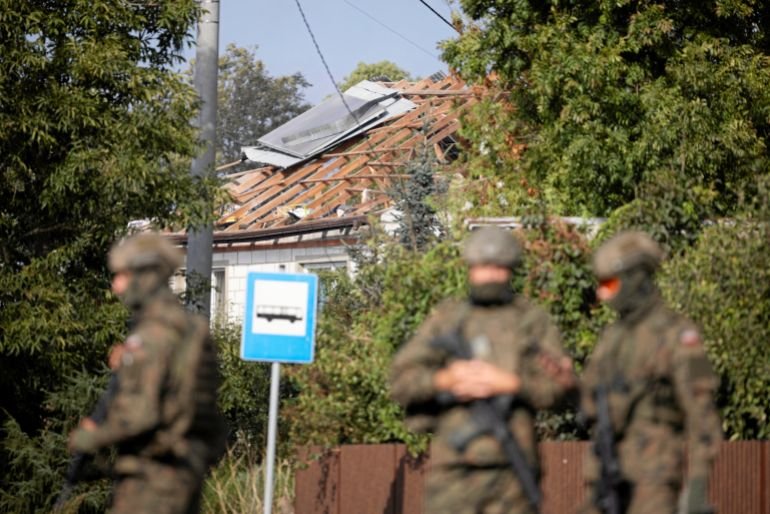
Polish and NATO forces scrambled to intercept Russian drones which entered Poland’s airspace early on Tuesday night and early on Wednesday, marking their first direct military engagement with Moscow since the Kremlin’s full-scale invasion of Ukraine began in 2022.
Both Polish and NATO jets responded to the violation of Polish airspace, which occurred during a Russian aerial attack on Ukraine. “There was an unprecedented violation of Polish airspace by drone-type objects,” the Polish military operational command said in a statement. “This is an act of aggression that posed a real threat to the safety of our citizens.”
Poland temporarily shut down at least three of its airports, including Warsaw’s Chopin Airport, the country’s largest, and advised people to stay at home while the operation continues. People in risk-prone areas in eastern regions of Poland bordering Ukraine, including the capital of Warsaw, have been told to take shelter.
“There is no reason to claim that we are in a state of war… but the situation is significantly more dangerous than all previous ones,” said Polish Prime Minister Donald Tusk. He added that the prospect of a large military conflict is “closer than at any time since the Second World War”.
The Russian drone incursion comes just three days after Moscow hit the main government building in Ukraine’s Kyiv. That attack also damaged the European Union and British Council buildings in the Ukrainian capital.
So, is NATO now inching towards a war with Russia?
What has happened in Poland?
On Wednesday morning, the Polish military said it had shot down “drone-like objects” which entered its airspace during a Russian aerial attack on neighbouring Ukraine.
According to Polish officials, the drones crossed the border amid a wave of Russian aerial strikes targeting western Ukraine, triggering an immediate military response, which was joined by Polish F-16 fighter jets, Dutch F-35, and Italian AWACS surveillance planes.
One of the drones struck a residential building in Wyryki, eastern Poland. Nobody was injured, according to the Reuters news agency.
This is the first time that NATO-allied forces have engaged Russian military assets since Moscow invaded Ukraine in February 2022.
Tusk called Russia’s violation of Polish airspace by a “huge” number of Russian drones a “large-scale provocation”. He added that the NATO forces had shot down the ones that posed any threat.
Later in the day, Tusk informed Poland’s parliament that the first violation of Polish airspace occurred at about 11:30pm (21:30 GMT) on Tuesday, and the last was reported at 6:30am (04:30 GMT) on Wednesday.
He added that preliminary reports suggest there were 19 airspace violations in total, with a “significant number” of drones crossing into Poland.
“We are ready to repel such provocations. The situation is serious, and no one doubts that we must prepare for various scenarios,” Tusk said in his statement. “All our allies are taking the situation very seriously. We have not recorded any casualties.”
Tusk also convened an emergency meeting with his top cabinet ministers and stated that his office was in contact with NATO officials.
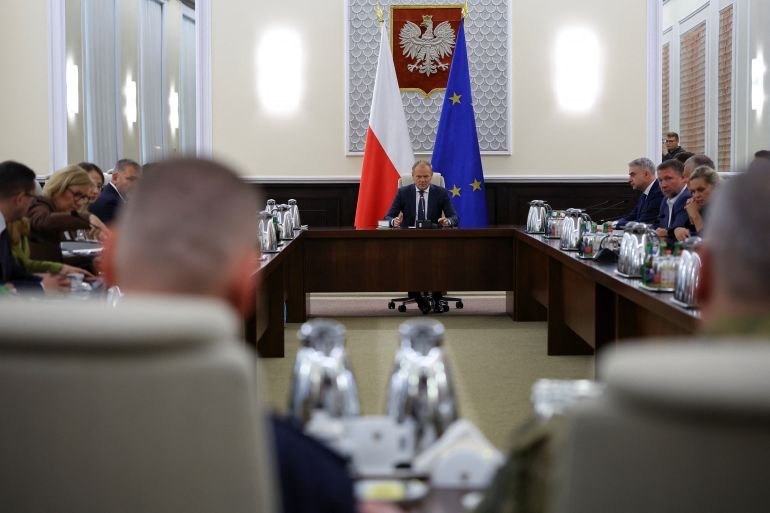
Could this drag NATO into Russia’s war in Ukraine?
The incident has thrust NATO’s collective defence principles into the spotlight. Being a NATO member, a drone attack on Poland could trigger Article 5 of the NATO treaty.
That article forms the cornerstone of the alliance’s collective defence strategy. It states that an “armed attack” against one or more members in Europe or North America shall be considered an attack against all, obligating allies to take action, including the use of armed force, to restore security.
Article 5 is not triggered automatically by such an attack, but can be initiated by an affected nation. It requires a consensus among NATO’s 30 member states that the incident meets the threshold of an attack warranting collective action.
Since the treaty was first signed in 1949, Article 5 has been invoked only once, following the September 11, 2001, attacks on the US.
Will Poland initiate Article 5?
Not quite yet. Tusk said Poland will invoke Article 4 of the treaty, under which a nation can request a formal consultation within the alliance if it believes its security has been threatened. This would serve as a political precursor to Article 5 deliberations.
Historically, Article 4 has been invoked only seven times since NATO’s creation; the last time was by Bulgaria, the Czech Republic, Estonia, Latvia, Lithuania, Poland, Romania and Slovakia in 2022 immediately after the Russian invasion of Ukraine.
While Tusk said he appreciates expressions of solidarity, “the words are not enough” and Poland will request “much greater” support from its allies.

How has the EU responded to this incident?
The EU’s top diplomat, Kaja Kallas, vice president of the European Commission, said the incident marked an escalation of Russia’s war in Ukraine.
“We must raise the cost on Moscow, strengthen support for Ukraine, and invest in Europe’s defence,” she said in a statement posted on X. “The EU plays a major role and we will support initiatives like the eastern border shield defence line.”
Kallas said the EU stood in “full solidarity with Poland” and called the Russian drone intrusion “the most serious European airspace violation by Russia since the war began, and indications suggest it was intentional, not accidental”.
EU’s defence commissioner, Andrius Kubilius, also emphasised the need for a “drone wall” along its shared borders. “Once again Russia tests frontier states, EU & NATO,” Kubilius wrote in a post on X. “We shall work together with member states, frontier countries and Ukraine. Russia will be stopped.”
How has Ukraine responded?
Ukraine’s president, Volodymyr Zelenskyy, warned that Moscow was continuing to “push the boundaries of what is possible” by aiming drones at Poland.
“If [Russia] does not encounter a strong reaction, it remains at the new level of escalation,” Zelenskyy said, adding that 15 regions of Ukraine had been targeted overnight in a “massive” attack by 415 drones of various types and more than 40 cruise and ballistic missiles.
“The Russians must feel the consequences. Russia must feel that the war cannot be expanded and will have to be ended,” said the Ukrainian president.
What else is Russia doing right now?
The violation of Polish airspace by the Russian drones comes as Moscow ramps up its attacks on Kyiv, stalls ceasefire talks and plans military exercises in neighbouring Belarus.
Poland said it would close its border with Belarus on Thursday, at midnight (22:00 GMT), in advance of an upcoming military drill.
Russia and Belarus’s large-scale military exercises, called the “Zapad” drills – meaning “west” in Russian – typically involve thousands of troops, tanks, aircraft and live-fire operations across western regions. The drill is a particular security concern for neighbouring NATO member states Poland, Lithuania and Latvia.
“On Friday, Russian-Belarusian manoeuvres, very aggressive from a military doctrine perspective, begin in Belarus, very close to the Polish border,” Tusk told a government meeting in Poland.
Belarus’s defence minister said this year’s Zapad would include drills for the possible use of nuclear weapons and the Russian-made, intermediate-range hypersonic Oreshnik missile.
Past Zapad drills have prompted concerns in the West, most notably in 2021, when Russian troops deployed in Belarus for exercises stayed for longer than expected and then spearheaded one part of the 2022 invasion of Ukraine.
India, which has been hit by United States President Donald Trump with additional trade tariffs for buying Russian oil, is also expected to join the seven-day military drill. Trump is now also pushing the EU to levy a 100 percent trade tariff on India – and has reportedly offered to match this if it agrees.
Despite sustained diplomatic engagement for months as well as pressure from the US, the gap between Moscow and Kyiv shows little sign of narrowing, particularly on issues such as territorial concessions and post-war security arrangements.
Top Stories
Charlie Kirk shot and killed at Utah event; manhunt for shooter still ongoing
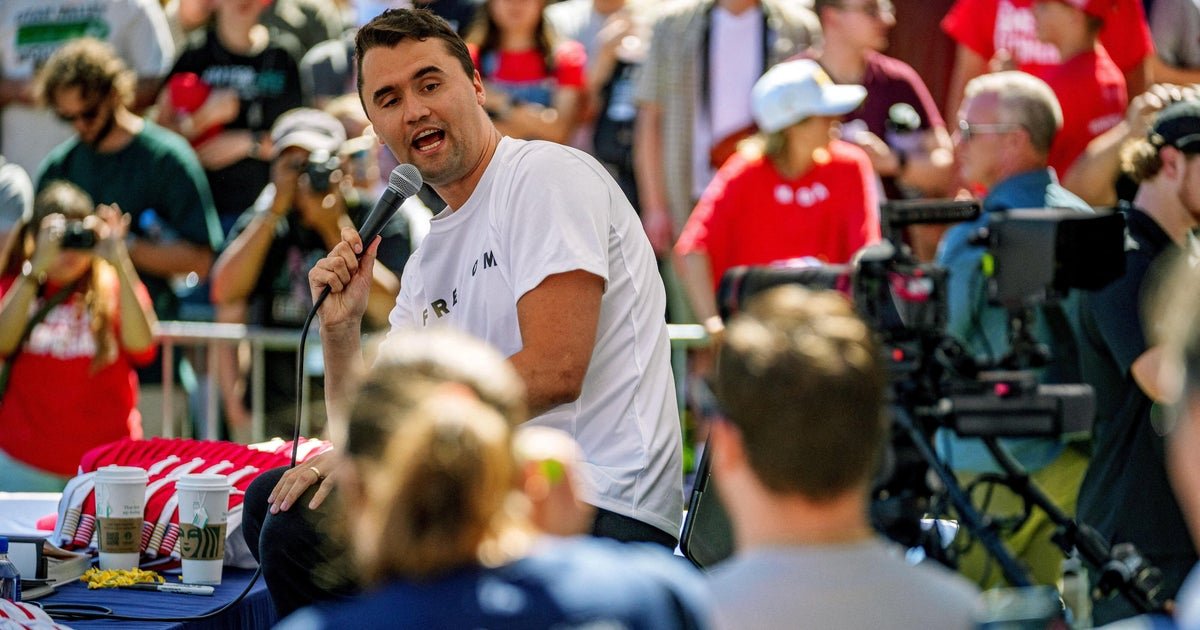
Conservative activist and Turning Point USA co-founder Charlie Kirk died Wednesday after he was shot at an event at Utah Valley University. He was 31 years old.
A suspect has not been identified, and state authorities said Wednesday evening a “manhunt” for the shooter is still in progress. Two people who were taken into custody earlier were not tied to the shooting and were later released.
Utah Valley University police said they were going “building to building” to evacuate people.
President Trump posted on Truth Social: “The Great, and even Legendary, Charlie Kirk, is dead. No one understood or had the Heart of the Youth in the United States of America better than Charlie. He was loved and admired by ALL, especially me, and now, he is no longer with us. Melania and my Sympathies go out to his beautiful wife Erika, and family. Charlie, we love you!”
Kirk was participating in an event at the Orem, Utah, school as part of his organization’s “The American Comeback Tour” when he was attacked.
The university said in a statement shared to social media that a shot was fired at Kirk shortly after 12 p.m. local time, and he was hit. A single shot was fired, two law enforcement sources told CBS News.
Video of the incident showed Kirk speaking to a large crowd at an outdoor “Prove Me Wrong” debate, where he invites students to challenge his political and cultural views, when the shot rings out.
Elected officials on both sides of the aisle had swiftly condemned the attack on Kirk and denounced acts of political violence.
Top Stories
‘Harry’s tea with the King’ and ‘Mandelson on brink’

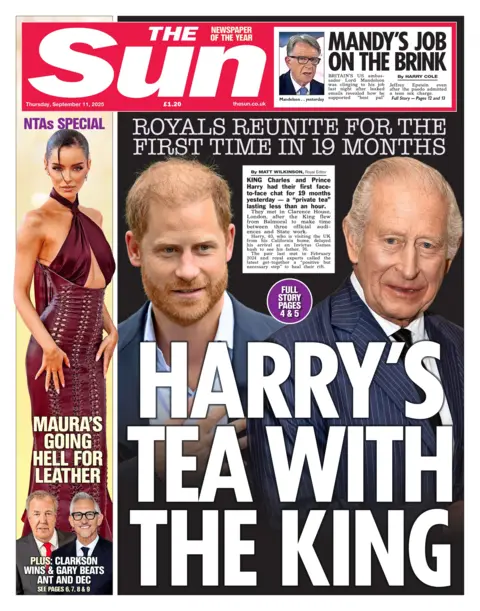


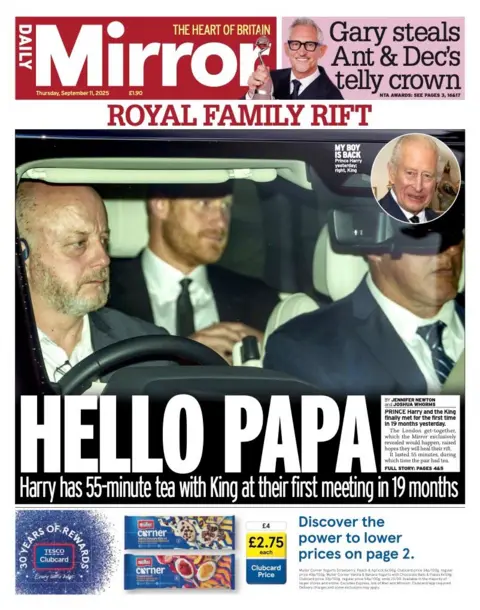

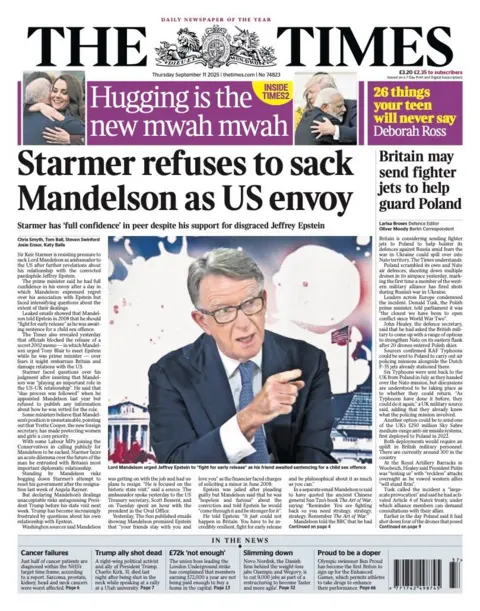
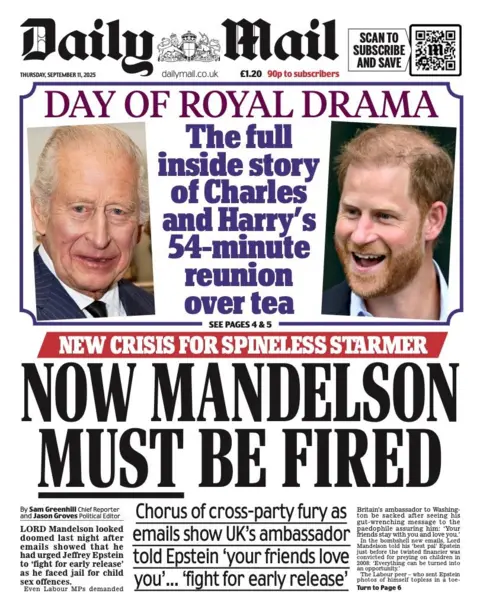




Two men feature prominently on many of the front pages on Thursday. The first is Lord Mandelson, under increasing pressure over his friendship with Jeffrey Epstein. “Now Mandelson must be fired” is the main headline in the Daily Mail, which talks of a “chorus of cross-party fury”. The i Paper describes the position of the British ambassador to the US as being “on the brink”.
One person familiar with the process of appointing Lord Mandelson to the Washington job tells the Guardian he would been subject to the highest level of checking – known as developed vetting – which is likely to have touched on his association with Epstein. In its leader column, the Daily Telegraph says that, once again, this is a story about Sir Keir Starmer’s weakness in dealing with personnel issues in his government.
Prince Harry is also pictured on the front of many of the papers, arriving at Clarence House to meet his father, the King, for tea. “When Harry met Charlie” is the headline in the Daily Star. The Sun goes with: “One’s tea for two”. For the Mirror, the reunion raises hopes the pair can heal their “damaging rift”.
Elsewhere, both the Telegraph and the Times say Britain is considering sending fighter jets to Poland to help bolster its defences after Russian drones were shot down over its territory. In an editorial, the Times says Moscow’s drone raid was a “blatant provocation” requiring a united response
The main story for the Financial Times is the decision of the US drugmaker Merck to scrap a plan to build a one billion pound research centre in London and to lay off 125 scientific staff. The group said the UK was not “internationally competitive”. The head of the British Pharmaceutical Industry tells the paper the decision is a “real blow” to the UK’s ambitions to develop the life sciences sector.
And finally, several papers feature a picture of green fingered Lee Herrington who’s grown a pumpkin weighing 53 stone. He tells the Daily Express the key to his success is giving it ten gallons of water a day, plus a regular helping of cow dung.


-

 Business2 weeks ago
Business2 weeks agoThe Guardian view on Trump and the Fed: independence is no substitute for accountability | Editorial
-
Tools & Platforms4 weeks ago
Building Trust in Military AI Starts with Opening the Black Box – War on the Rocks
-

 Ethics & Policy2 months ago
Ethics & Policy2 months agoSDAIA Supports Saudi Arabia’s Leadership in Shaping Global AI Ethics, Policy, and Research – وكالة الأنباء السعودية
-

 Events & Conferences4 months ago
Events & Conferences4 months agoJourney to 1000 models: Scaling Instagram’s recommendation system
-

 Jobs & Careers2 months ago
Jobs & Careers2 months agoMumbai-based Perplexity Alternative Has 60k+ Users Without Funding
-

 Podcasts & Talks2 months ago
Podcasts & Talks2 months agoHappy 4th of July! 🎆 Made with Veo 3 in Gemini
-

 Education2 months ago
Education2 months agoMacron says UK and France have duty to tackle illegal migration ‘with humanity, solidarity and firmness’ – UK politics live | Politics
-

 Education2 months ago
Education2 months agoVEX Robotics launches AI-powered classroom robotics system
-

 Funding & Business2 months ago
Funding & Business2 months agoKayak and Expedia race to build AI travel agents that turn social posts into itineraries
-

 Podcasts & Talks2 months ago
Podcasts & Talks2 months agoOpenAI 🤝 @teamganassi


















